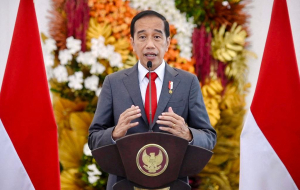Local cosmetics market in Indonesia declines amid influx of imports
The local cosmetics market in Indonesia is currently experiencing a significant downturn. The government is now addressing the presence of imported goods on e-commerce and social commerce platforms.
In the past two years, share for the local market dropped from 80% to 40%, according to data from the Ministry of Cooperatives and Small and Medium Enterprises (UKM).
Hanung Harimba Rachman, Deputy for UKM at the Ministry of Cooperatives and UKM, revealed its recent finding, several fashion businesses have closed, and shoe companies have been affected by the proliferation of online trading.
As of 2022, the majority of consumer demand for cosmetics preferred local brands, accounting for 54%, with 11% opting for international brands, while the remaining 35% had no preference.
During the period of June to August 2022, the best-selling facial serums on e-commerce platforms included Somethinc with 255,000 products sold, Scarlett with 228,700 products sold, and Garnier with 147,400 products sold. Other top-selling brands like Avoskin, Whitelab, Azarine, Wardah, Skintific, Y.O.U., and Implora also ranked highly, falling just below the top three best-selling products.
Shopee, one of the prominent e-commerce platforms in Indonesia, reported that the beauty category recorded the highest sales during the 7.7 and 9.9 discount campaigns.
Products such as moisturizers, face masks, lipsticks, foundations, and body wash were among the best-sellers. Notably, Skintific and The Originote were the top-selling brands on Shopee.
Chinese products dominates the industry
BPOM (Indonesia's National Agency of Drug and Food Control) data revealed that many registered brands originate from China, such as Skintific with its manufacturer, Shanghai Xuanmei Biological Science and Technology Co Ltd, and The Originote with its manufacturer, Shanghai Ayara Cosmetics Co Ltd.
Teten Masduki, the Minister of Cooperatives and Small and Medium Enterprises, pointed out that nearly 80% of online platform sellers offer imported products, mainly from China. He suggested that excess supply of consumer goods in China might be entering the ASEAN market.
Indonesia, with its substantial market and nearly half of its population participating in e-commerce, is facing challenges related to low import duty rates.
This situation has made it difficult for MSME (Micro, Small, and Medium-sized Enterprises) products and manufacturing industries, particularly in sectors like garments, cosmetics, sports shoes, and pharmaceuticals, to compete.
Teten Masduki noted that it might be too late to regulate e-commerce and social commerce platforms and that Indonesia is being dictated by global digital platforms.
Addressing these issues will require multiple policies, including those related to investment, trade, and product standardization.
Tag
Already have an account? Sign In
-
Start reading
Freemium
-
Monthly Subscription
30% OFF$26.03
$37.19/MonthCancel anytime
This offer is open to all new subscribers!
Subscribe now -
Yearly Subscription
33% OFF$228.13
$340.5/YearCancel anytime
This offer is open to all new subscribers!
Subscribe now





